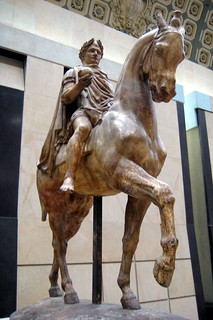Power and Darkness
The Septimius Syndrome
In ancient times there was a Roman Emperor named Septimius Severus. Septimius was highly educated for his times, extremely intelligent, charismatic, handsome, and polished. He spoke several languages, studied literature and philosophy in Athens, and later became a lawyer in Rome. Long before he became the Emperor, Septimius was thought of as one of the most brilliant minds in Rome. As a soldier and general, he was known for his daring and ruthlessness.
In 193 AD Rome was in political turmoil. The Emperor Commodus, son of Marcus Aurelius, had recently been assassinated. After his assassination and the assassination of his successor, Pertinax, the Praetorian Guard decided to auction off the office of the Emperor to the highest bidder. The unfortunate winner of the Emperor sweepstakes was a senator named Didius Julianus, who had been talked into bidding for the office of Emperor by his wife and daughter. Julianus agreed to pay each member of the Praetorian guard five thousand drachmas to become Emperor. Shortly after Julianus’s installation, however, Septimius decided that he wanted to be the Emperor. He also knew that other Roman generals were thinking the same thing. So he seized the moment, marched his legions on Rome, and took control of the empire with hardly a struggle.
During his takeover, a tribune in Septimius’s service found Julianus cowering in a palace bathroom and beheaded him. After his ascension to imperial power, Septimius executed many more senators. He ruled the Roman Empire with a strong hand for eighteen years, becoming the most famous, powerful, and wealthiest man of his age.
On his deathbed in York, England in 211 AD after an extensive military campaign in Caledonia (Scotland), Septimius had a chilling revelation. In a moment of clarity, he saw the real worth of his life and remarked, “I have been everything, and it is worth nothing.”
While Septimius may have been everything, he had failed to find himself until it was too late to nurture his soul. He had fulfilled his desires and taken from life all that his vast appetites had demanded, but it hadn’t been enough. His accomplishments and acquisitions had never relieved the burden of his inner darkness. All his power, wealth, and fame had done was obscure his emptiness and dissatisfaction with life. At the end, when his moment of truth came the great wealth he had accumulated and the power and fame he had seized mocked him. No time remained to burn out the darkness in his soul that tormented him: no time to turn on his inner light, redeem himself, or clear his karma. He went to his death internally bankrupt, the inner person starving, incomplete, and unfulfilled. His life of external magnificence had been a life of internal failure.
Septimius had controlled an empire and decided the fates of entire populations, but he had never found real freedom. He had conquered the world but never conquered himself. He had been too in love with power to bother with his soul. In the end, his love of power had not liberated him, but had, rather, enslaved him. Unfortunately for Septimius, his failure to find himself was not the end of his journey but only it’s beginning. In addition to neglecting his inner person, he had generated a great deal of negative karma that would have to be worked out in future lives.
Choices
Life is about the choices we make. Those choices determine our future. The wise person chooses to advance his evolution and contribute to the common good. The foolish person wastes his time wallowing in the gulf of confusion, creating more negative karma that will slow his progress toward life’s inevitable goal. It is far better to discover the light within us and walk the path of wisdom while we still have the time to travel far down that path. It does no good to come too late to this work.

